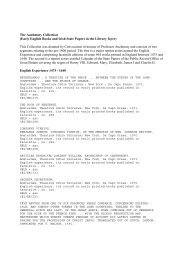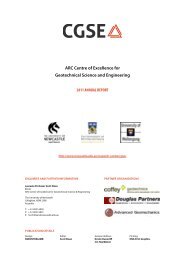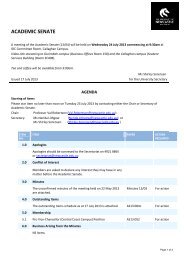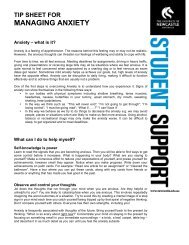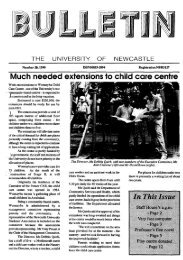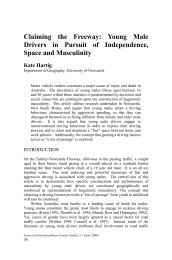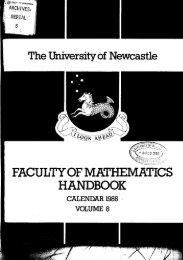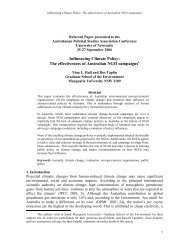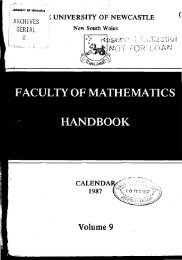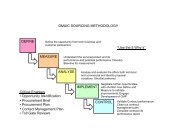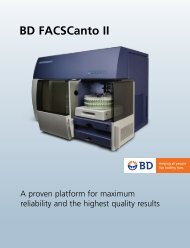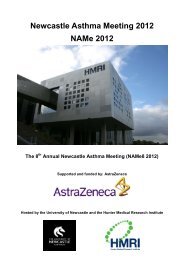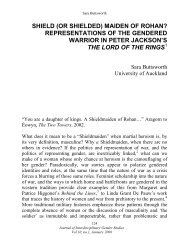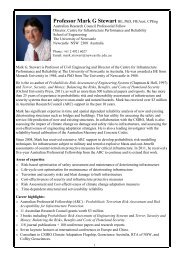n - University of Newcastle
n - University of Newcastle
n - University of Newcastle
Create successful ePaper yourself
Turn your PDF publications into a flip-book with our unique Google optimized e-Paper software.
1 6 AN AUSTRALIAN LAFGU.4GE.<br />
If it is desired to give emphasis to the iclea that the action is con-<br />
tinuative, a separate word is usecl to denote this. Thus alelz,<br />
wilich is the strengthenecl form <strong>of</strong> en, is purely a participle with-<br />
out distinction <strong>of</strong> time. The forms in ?., I-e are simple variations <strong>of</strong><br />
19, and seldom usecl. The forms in g, ng-g, are from ga, 'to go on,'<br />
aud those in b from bn, ' to make,' ' cause to be.' The following<br />
table mill show the rarious possible forms in which a verb may<br />
be found. The separable demonstrative particles inserted in the<br />
tsble are :-he, bot, yun, de, ji. Bo ancl be seem to adcl notlung<br />
to the meaning ; yzob means ' there'; di or ji means ' to ' or 'at.'<br />
To the forms in italics, the separabb demonstrative particles are added.<br />
,--Simple- , -Componncl. -<br />
"1. -a, -e, -ncle. -ale -ga. -pi& -ball&.<br />
7<br />
-el&.<br />
-errat.<br />
-g;a. -ggle.<br />
2. -ah.<br />
-ela.<br />
-alela.<br />
-elel&.<br />
-gala.<br />
-g;ala.<br />
-cale!a.<br />
9<br />
-,galela.<br />
-bulela.<br />
-erralat.<br />
3. -an.<br />
-anbe.<br />
-Ian.<br />
-rant.<br />
-ran.<br />
?<br />
-=an.<br />
-alzji.<br />
4. -anne.<br />
-inne.<br />
-alinne. -nklne.<br />
?<br />
-gi me.<br />
-nalinine.<br />
-&alinne.<br />
-bulenne.<br />
-unne.<br />
5. -oro. -aloro. -galore.<br />
-eloro. -&galore.<br />
6. -en.<br />
-er~yzc?z.<br />
-nloroby.<br />
-allen.<br />
-arent.<br />
-wn.<br />
?<br />
-ggen.<br />
-gnloroby.<br />
-uallen.<br />
?<br />
-ggallen.<br />
-bulen.<br />
-bulelzji.<br />
-trllenji. -gel+ -gnlbl?ji. -buleny~lz.<br />
7. -inns ; 8. -ian ; 9. -ia, -aia, -8 ; compouncl, -nlia ; 10. -ai ;<br />
compouncl, -bai ; 11. -enden ; compound, -genclen, -ggenden ; bunclen.<br />
"The numbers indicate the BIoods and Tenses ; thus, 1 is the I?nperatiue<br />
Jfood ; 2, The Present Tense ; 3, Tlie Future Tense ; 4, Il'lie Past (unjnished) ;<br />
5, The Past (.f~ziahed) ; 6, A Participle form (<strong>of</strong>lsn past) : i, A Pal-ticiple<br />
fornt (generully pres~nt) ; 5, A Participle form (oj:en passive) ; 9, A AToz61t<br />
fornt <strong>of</strong> Fe~e, bal action (the i11jnitiz.e) ; 10, The Stib,'tlltctice, i.e., the .form<br />
which the verb takes when compo.u~tded with Azixilialy Verb9 ; 11, A Participle<br />
form (gertcrally passive.) 2, 3, 4, and 5 are <strong>of</strong> the Indicative &Iood.<br />
Besides these, there are some other compound verbal suffixes<br />
which are formed from indn and ?,$a, and from b and ba, as shown<br />
THE XISTUSC DIILECT.<br />
17<br />
IG~ZCZCL, ' make.' .<br />
his, as a principal rerb, has all the forms <strong>of</strong> the simple su$xes<br />
except KO. 11, ailcl many <strong>of</strong> the coi~lpouilcl ones ; as, kindn-bu lela,<br />
kincla-galoroby, kc. It son~etinles takes the form, thougl: rarely,<br />
<strong>of</strong> kigge, ancl, as such, enters into coll~position wit11 other verbs ;<br />
but the usual methocl <strong>of</strong> compounding it with verbs is to omit the<br />
k, and use only the terminations ; as, bo-al6, ' be great,' bo-inclal&,<br />
'be n:acle great.' In the AIinyug dialect, when two words are<br />
brought together, it is common for the secoilcl to lose its initial<br />
consonant. lii,zcln itself is a deriratire from dch, mhich is in use<br />
to turn nouils and acljectives into verbs ; as, urnbin, 'a house,'<br />
um bin-cla, ' make a house.'<br />
Bcc, ' cause to be.'<br />
Zn, as a locative, is also a noun-su5ix, but, like dn, it helps tcr<br />
convert other morcls into verbs ; as, kirriba, 'awake.' As already<br />
noticed, it enters into composition rritll verbs, lengtheniilg their<br />
forms, at times, without aclcling to or altering their meaning. As<br />
part <strong>of</strong> a principal verb, it generally has the meaning <strong>of</strong> 'cause to<br />
be '; as, ny arry, ' a name,' ny arri-ba, ' give a name ' 01- ' cause to<br />
ha~e a name.' It is also attached to the past tense, and is <strong>of</strong>ten<br />
used when a secondary verb is in a seiltellce ; e.g., monno me bit ro<br />
kunjillinileban nobo, 'that fire mill be lightecl' (uncle to burn)<br />
to-morro\~.'<br />
-K7, 'make,' ' cause to be there,' 'cause' generally.<br />
This is one <strong>of</strong> the nlost important verbal suExes in the language.<br />
,4s a nou~l-s~lEs, it has the sense <strong>of</strong> 'in,' ancl many <strong>of</strong> its derivative<br />
words have the iclea <strong>of</strong> rest in a place,' and not <strong>of</strong> causation.<br />
Jfaiffi means 'in a place,' while Laia meals 'go to a place.' Wain:aia<br />
means ' it is above '; waikaia, ' go above.' It is eviclent<br />
that l1zn originally meant both.' there ' ancl' cause to be ' generally..<br />
But, after all, there is nothing strange in this. Eren no\v, with<br />
all the variation <strong>of</strong> forms, a good cleal <strong>of</strong> the meailing <strong>of</strong> n speaker<br />
depends upon the tone <strong>of</strong> the T-oice or the gesture <strong>of</strong> the hand.<br />
TVe call coilceive <strong>of</strong> a demonstrative as meaniag (1) 'there,' (5) 'go<br />
there,' (3) 'be there,' (4) 'cause to be there,' according to the tone <strong>of</strong><br />
voice ancl the sulject <strong>of</strong> conversation. Ally acljective can take this<br />
suffix ; as, yily 61, ' sick,' y ily 61-ma. 'cause to be sick7; clukkai,<br />
'dead,' dukai-ma, 'to Bill.' It enters into conlposition with adverbs<br />
<strong>of</strong> place as well ; as, with mai, ' above,' ancl kully, ku nd y, q.v., it<br />
gires maikalkullima, 'put crosswise,' waiknnclima, 'put on.'<br />
It sometimes follows acljectix-es ; as, bunyarra-ma yerritbil,<br />
' make a good song7; and sometimes pronouns ; as, kaibi-ma<br />
junak, 'make another hiuldle.' With verbs, it is sometinles<br />
b



